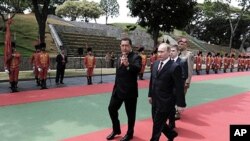Russia and Venezuela are forging closer ties. Russian Prime Minister Vladimir Putin announced earlier this week (Monday) in Caracas that his country could sell Venezuela up to $5 billion worth of weapons. That's on top of $4 billion in arms that Venezuela previously purchased from Russia. Some analysts are warning of where the close relationship will lead.
A welcoming ceremony decked out in red for the two leaders, meeting in Caracas. Russian Prime Minister Vladimir Putin on his first visit to the South American country and his host, Venezuelan President Hugo Chavez.
They talked about cooperation on a satellite launch site to begin Venezuela's space program. A joint venture on oil exploration in eastern Venezuela. And, a nuclear power plant.
"We have talked about nuclear energy, and we're ready to start drawing up the first plan of a nuclear power plant, obviously with peaceful aims," Mr. Chavez said.
"One question, why nuclear? Long term investment, very expensive," Peter DeShazo questioned the details. He's the director of the Americas program at the Center for Strategic and International Studies. "There's not a whole lot of transparency in all this, so it's pretty hard to determine really how much money is being spent, has been spent, is to be spent, what the details of all these agreements really are. None of this is all that clear," he added.
In the past five years, Venezuela has purchased $4 billion of Russian arms, including fighter jets, Mi-17 helicopters and 100,000 Kalashnikov rifles. The Russian prime minister said after this trip, Venezuela will buy $5 billion more in Russian weaponry. The United States wants to know why.
"We are hard pressed to see what legitimate defense needs Venezuela has for this equipment," State Department Assistant Secretary P.J. Crowley said.
Michael Shifter is president of a Washington foreign policy group. He says the world should be concerned about Venezuelan motives for all that firepower. "It has sort of a belligerent quality to it and that can lead to I think reckless conduct, that can lead to serious consequences, so I think it is a problem," Shifter said.
Mr. Chavez has said the purchases are to counter U.S. influence in Latin America, especially in Colombia. But the Russian motivation is a bit different. Experts, including Mr. Putin himself, say it's mainly a commercial venture and Russia is filling a void.
"If the United States does not want to sell its military equipment to other countries, and in particular Venezuela, well it's difficult for him to hear, but it's good for us, and long may it continue - as we say in Russia, there's always someone to fill a vacancy," Putin stated.
Some think Russia also wants to prove its strength, especially in America's backyard....Latin America. But the promises of more arms and agreements for space programs, oil and nuclear power come at a time when both Russia and Venezuela face monumental internal problems.
"There's no electricity and no water for the people Chavez represents, the poorest people," Shifter said. "I think it's very hard to take seriously that pledge that he's going to move in that direction."
Meantime, the two men are seriously reinforcing their relationship. Mr. Chavez, ended their Caracas meeting, by giving Mr. Putin the Simon Bolivar sword -- the symbol of Venezuela's independence.









